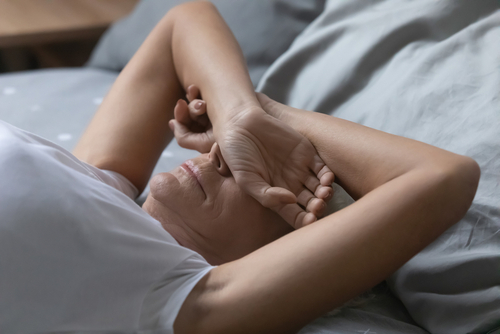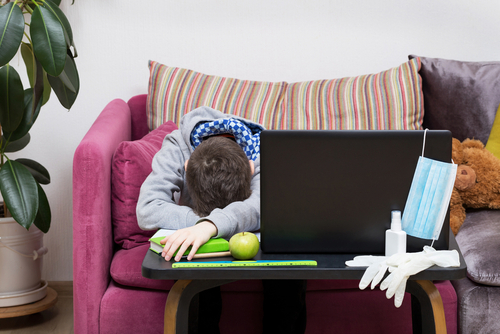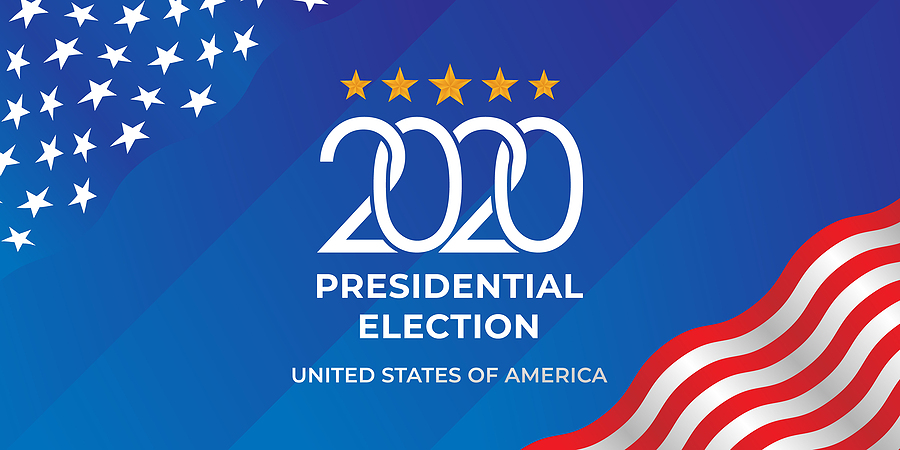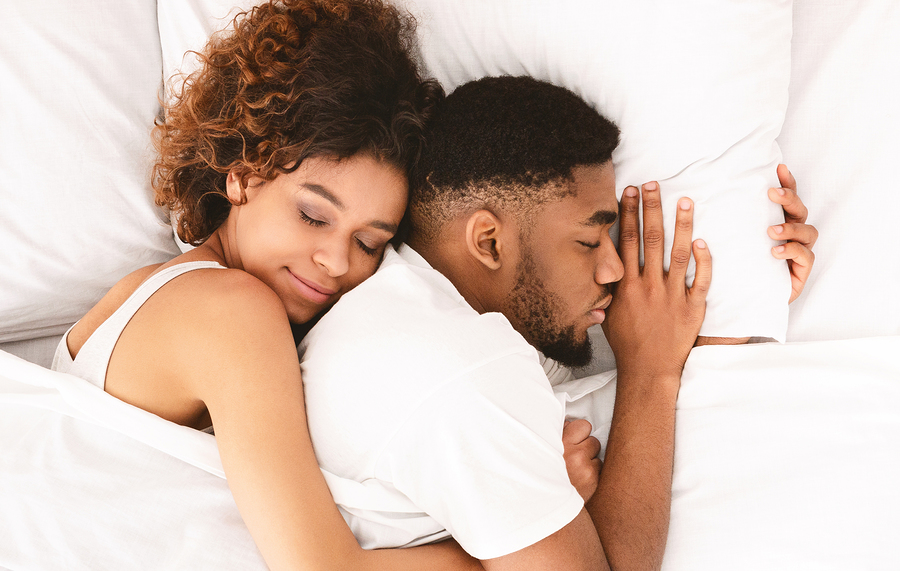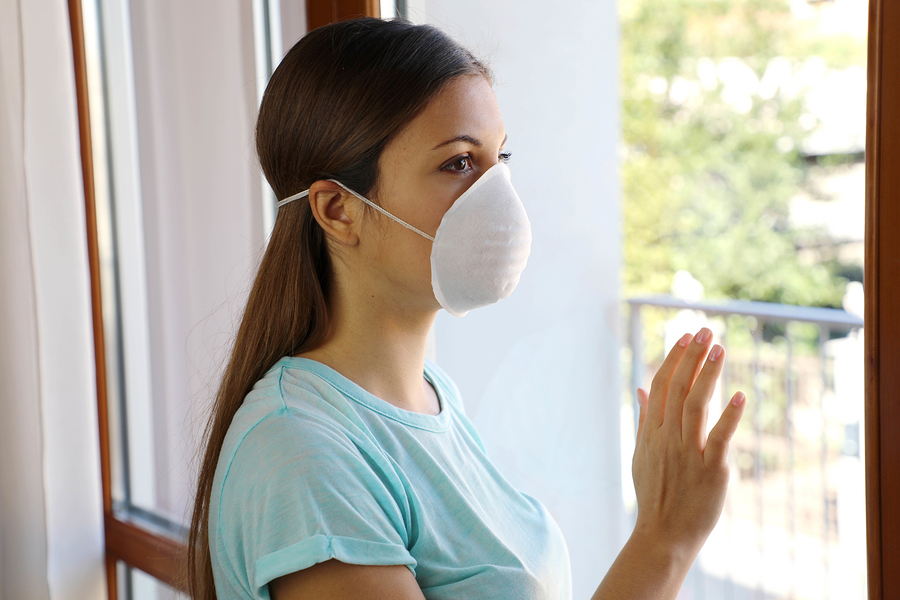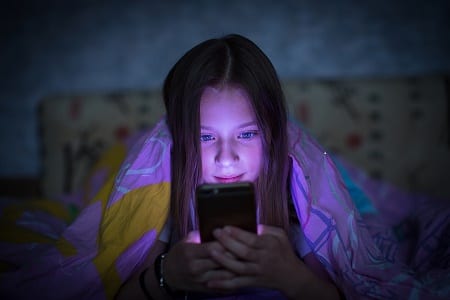According to the Sleep Foundation, sleep disorders affect 39% to 47% of peri-menopausal women and 35% to 60% of postmenopausal women.
So why do the hormonal changes during menopause have such a big effect on sleep and how can you reduce their impact?
And, what alternatives are there to taking Hormone Replacement Therapy and prescription medicines?
How do Hormonal Changes Affect Sleep?
Progesterone promotes sleep, via its impact on GABA a neurotransmitter, which helps you switch off and fall asleep. The loss of Progesterone in menopause makes it harder to both get to sleep and stay asleep.
The loss of Oestrogen creates a variety of effects and contributes to Hot Flashes which affect up to 80% of all menopausal women. Here the loss of Oestrogen affects the temperature sensitivity of the Hypothalamus. This Hypothalamus is the part of the brain which regulates a number of homeostatic functions including body temperature, reproduction, energy balance and stress. Hot Flashes typically occur more often at night, when Oestrogen levels are at their lowest. Research has shown that Hot Flashes are triggered by an accompanying adrenaline spike in the brain which also heightens levels of alertness.
The loss of Oestrogen can also affect Melatonin production via its role in Serotonin metabolism ( a building block of Melatonin. Oestrogen reduction also causes changes in mood and memory associated with menopause.
Dietary Recommendations for Menopause
Altering your diet can have a massive impact on your symptoms.
Try to eat;
Soy products: (good quality tofu, soybeans, and soymilk) contain phytoestrogen, a plant hormone similar to estrogen. These have mixed research on reducing hot flashes. I would not however recommend Soy in powdered form.
Foods that provide Calcium: such as the bones of soft bony fish (sardines etc) and nuts to help with the Osteoporosis risk from menopause.
Nuts for Magnesium: are also a great source of Magnesium (especially Brazil Nuts and Almonds as is brown rice and dark green leafy vegetables. We are often deficient in Magnesium, which affects our sleep and magnesium is good for bones and can reduce hot flashes. If you are taking Magnesium as a supplement always use the Gylcinate or Threonate forms of Magnesium rather than Magnesium Citrate
More fibre and water to soften stools: When Oestrogen declines, cortisol levels rise which can slow down the digestive process, lengthening the amount of time it takes for food to break down. This, in turn, can make stools more difficult to pass
Natural unsweetened yoghurt: and a pro-biotic diet to help support the beneficial gut flora. Our gut flora is especially important in sleep and can be affected by hormone fluctuations.
A (low fat) vegetarian-based diet with whole soya beans: was shown to significantly reduce menopausal symptoms.
With regards to your overall diet, a Mediterranean diet is recommended as best for health and sleep.
What to avoid.
Avoid spicy and acidic foods: which may trigger Hot Flashes.
Avoid Alcohol: it increases Hot Flashes and disrupts restorative sleep.
Reduce Caffeine: it can increase Hot Flashes, so best limited or avoided especially after lunch.
Avoid eating large meals: especially before bedtime.
Eat less salt and sugar.
Practical Tips to Reduce Hot Flashes at Night
Here are 5 simple tips which can help.
1) Keep your bedroom cool at around 60–65-degree F: Use a fan or even put a wet towel between you and a fan to increase the cooling effect.
2) Cool your body: Spray your face with cold water when you feel an attack coming on. Wear loose bedclothes and light ones too such as silk or cotton. Moisture-wicking exercise clothes are also an option.
3) Get your bed and bedding cool: You could try a cooling gel pillow or even a cooling mattress such as a Chili pad. Having light, breathable, cotton sheets will help too.
4) Keep a glass of chilled water handy. But if you are going to the toilet more often try stopping fluid intake earlier in the evening.
5) Have a plan for when you wake up with a Hot Flash: Always This should include avoiding switching on the light on, looking at tech or switching on the TV which will stop you from getting back to sleep. Find something relaxing such as reading a book and having a change of clothing near to hand too.
Exercise and Menopause
Not only does exercise improve sleep, but some research suggests that exercise may reduce Hot Flashes. It’s suggested that this is due to its impact on thermo-regulatory control and vascular and cerebral circulation. Exercise also lifts our mood and reduces stress in general with weight-bearing exercise useful in preventing Osteoporosis too.
Vitamin D Supplementation
Studies have shown that decreased Vitamin D levels were significantly associated with Hot Flashes. Vitamin D deficiency also affects sleep quality and our mood. The N.H.S recommends that all adults should take a daily supplement containing 10 micrograms of Vitamin D during Autumn and Winter.
Vitamin E
Can reduce vaginal dryness when used topically. One study showed that it may also reduce hot flashes when taken orally with Curcumin. However, there is an insufficient amount of empirical evidence to conclude the effectiveness of vitamin E supplementation for menopausal symptoms.
Aromatherapy
Aromatherapy with Lavender Oil has been shown in one study to reduce Hot Flashes by 50%. However, there is insufficient evidence to support aromatherapy as a stand-alone treatment for menopausal symptom management.
Hypnotherapy
Research has shown Hypnotherapy intervention for hot flashes has been shown to result in a clinically significant reduction (ie, 50% or more) in hot flashes and associated symptoms. It’s recommended by the North American Menopause Society, and others, for the treatment of menopausal symptoms.
Herbal Remedies
Herbal supplements are often promoted for reducing the symptoms of Menopause, especially Hot Flashes. However, few are supported via evidence-based research with most having inconsistent results. In addition, Herbal Remedies vary greatly in quality. Always look for the THR stamp when choosing herbal remedies which is a stamp that they are regulated. Consult a trained Naturopath or herbalist or reputable high street retailer before taking, rather than buy online without checking first. Also, if you are taking prescription medicine talk to your GP first.
Black Cohosh: is probably the most widely used herb for Hot Flashes, but has mixed results in studies. One notable study showed helped when used in combination with St John’s Wort for depression related to menopause. Although it was not clear what the active ingredient was. Whilst Black Cohosh is phytoestrogen research has shown that it acts through mechanisms involving inflammatory, rather than oestrogenic, pathways.
Red Clover: has anecdotal and research reports of its helpfulness, as a phytoestrogen. However, the biggest study on its effectiveness was inconclusive.
Ginseng: some studies show that Ginseng can help with some of the sleep disturbances and mood swings and improved sense of wellbeing. However, Ginseng isn’t proven to help Hot Flashes.
Kava: potentially works more on mood than Hot Flashes.
Evening Primrose Oil: whilst promoted for relieving Hot Flashes its use is not proven in research. Equally, it has interactions with other drugs and has a number of side effects. So always check with your GP before using.
Valerian: is used as a sleep aid as it increases the amount of GABA in the brain, and can also help with Hot Flashes.
Lemon Balm: has been tested both in combination with Valerian and Fennel Juice with some good results for reducing Hot Flashes. More research is needed though.
Wild Yam, Dong Quai, Maca: Wild Yam and Dong Quai are used in Chinese medicine and Maca from South America with small scale research showing good results especially for Dong Quai when used with other herbs. However, as with all herbal medicine, none is regarded by the scientific community as having enough research to prove their efficacy and safety.
With regards to all herbal medicine, one of the largest reviews of the available research concluded there are no herbal treatments that have demonstrated consistent clinically meaningful benefits for menopausal symptoms.
Sleep Disordered Breathing and Sleep Apnoea
If you find you have breathing difficulties during and following menopause it’s important to check this with your GP especially if you are waking often in the night. Postmenopausal women have twice the likely incidence of Obstructive Sleep Apnoea ( 4% vs 2%) due to the reduction in Progesterone. Progesterone HRT may be recommended in such cases.
Relaxation Techniques
Relaxation techniques and meditation are great to help us get to sleep more easily. They are especially beneficial during menopause as they can also help with the mood alterations associated with menopause and reduce stress and even Hot Flashes too. In research, progressive muscle relaxation combined with slow deep breathing, called paced respiration, has been shown to decrease Hot Flash frequency by 50%. CBTi also achieves great results behind it and mindfulness and yoga are all fantastic too.
These mind-body interventions have few negative side effects and have well researched positive results.
General Sleep Advice
In terms of quality sleep, the usual sleep hygiene recommendations will always help such as a regular bed and wake time, and a good relaxing evening routine. Always keep technology out of your bed.
If you are losing sleep at night, catching up on sleep with a nap around the Siesta period just after you’ve had lunch period can be useful. However, always avoid napping after 4 pm or closer to your bedtime. This can prevent you sleeping well at night as it removes your ‘sleep pressure’. Also aim to keep your nap to a 20-minute power nap, if possible.
One thing to remember if you are having trouble getting to sleep or getting back to sleep in the middle of the night is to avoid lying in bed worrying about getting to sleep. If you are finding it hard to sleep the worry will often make it harder to nod off. If you find yourself awake for more than 20 minutes, get out bed and do something relaxing such as reading a book. Then come back to the bedroom when you feel sleepy again. In this way your brain associates your bedroom with sleep (and sex) only. This ‘paradoxical intention’ has been found to get us to sleep quicker than to close our eyes and force ourselves to feel tired.
I hope these tips help.
If you’d like support with menopausal symptoms including Hot Flashes and sleep, please book a free consultation so that we can discuss how I can help further. As a qualified hypnotherapist, I have great results.


